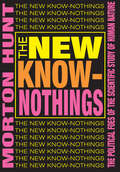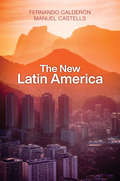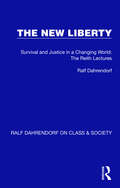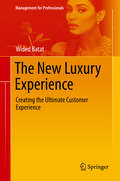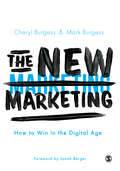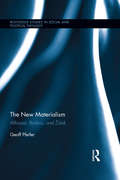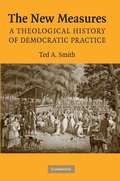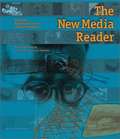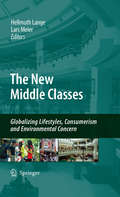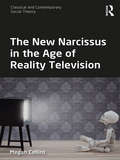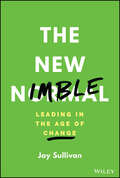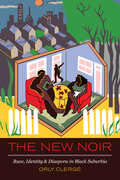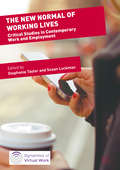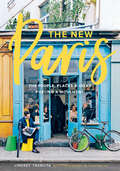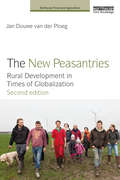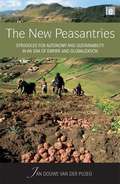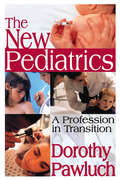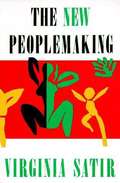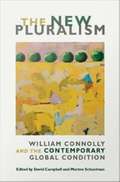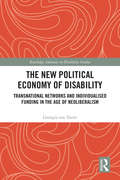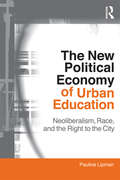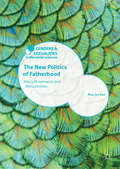- Table View
- List View
The New Know-nothings: The Political Foes of the Scientific Study of Human Nature
by Morton HuntIn recent years, political, religious, and other special-interest groups have waged war on behavioral and social research projects that threaten their interests and values. They have hounded researchers out of universities, cut off their funding through congressional and state legislative pressure, and harassed them with public demonstrations and picketing, all in the hope of forcing them to abandon their research. Formerly such unwanted involvement came from activists on the left. Now it comes from all across the political spectrum, as anti-science attitudes and techniques have diffused throughout society. In addition, conservative and religious forces lobby Congress and state legislatures against funding for major research projects of which they disapprove. This phenomenon represents a grave threat to both scientific freedom and the well-being of modern society.Morton Hunt gives us the first serious overview of this threat to behavioral and social science research. He illustrates precisely how scientific research has been subjected to political attack. The New Know-Nothings illustrates this phenomenon using in-depth case histories and background discussions of the conflicting social forces involved. It considers the prevalence of each form of opposition of research has been subjected to political attack. The New Know-Nothings illustrates this phenomenon using in-depth case histories and background discussions of the conflicting social forces involved. It considers the prevalence of each form of opposition to research, using interviews with expert observers in the sciences and government. Hunt reviews the nature-nurture debate, biological contributions to gender differences, conservative opposition to sex research in the schools, the debate over the controlled drinking approach to alcoholism, animal rights versus scientists' rights to use animals in research, the controversy over day care, anthropological research needs versus the Native American repatriation of re
The New Latin America
by Manuel Castells Fernando CalderonLatin America has experienced a profound transformation in the first two decades of the 21st century: it has been fully incorporated into the global economy, while excluding regions and populations devalued by the logic of capitalism. Technological modernization has gone hand-in-hand with the reshaping of old identities and the emergence of new ones. The transformation of Latin America has been shaped by social movements and political conflicts. The neoliberal model that dominated the first stage of the transformation induced widespread inequality and poverty, and triggered social explosions that led to its own collapse. A new model, neo-developmentalism, emerged from these crises as national populist movements were elected to government in several countries. The more the state intervened in the economy, the more it became vulnerable to corruption, until the rampant criminal economy came to penetrate state institutions. Upper middle classes defending their privileges and citizens indignant because of corruption of the political elites revolted against the new regimes, undermining the model of neo-developmentalism. In the midst of political disaffection and public despair, new social movements, women, youth, indigenous people, workers, peasants, opened up avenues of hope against the background of darkness invading the continent. This book, written by two leading scholars of Latin America, provides a comprehensive and up-do-date account of the new Latin America that is in the process of taking shape today. It will be an indispensable text for students and scholars in Latin American Studies, sociology, politics and media and communication studies, and anyone interested in Latin America today.
The New Legal Realism, Volume I: Translating Law-and-Society for Today's Legal Practice
by Elizabeth Mertz Stewart Macaulay Thomas W. MitchellThis is the first of two volumes announcing the emergence of the new legal realism as a field of study. At a time when the legal academy is turning to social science for new approaches, these volumes chart a new course for interdisciplinary research by synthesizing law on the ground, empirical research, and theory. Volume 1 lays the groundwork for this novel and comprehensive approach with an innovative mix of theoretical, historical, pedagogical, and empirical perspectives. Their empirical work covers such wide-ranging topics as the financial crisis, intellectual property battles, the legal disenfranchisement of African-American landowners, and gender and racial prejudice on law school faculties. The methodological blueprint offered here will be essential for anyone interested in the future of law-and-society. Demonstrates the importance of interdisciplinary translation between law and social sciences Introduces readers to the scholarship of today's leading new legal realists. Shows how new legal realism can provide a broader lens than the empirical legal studies movement.
The New Legal Realism, Volume II: Studying Law Globally
by Sally Engle Merry Heinz KlugThis is the second of two volumes announcing the emergence of the new legal realism. At a time when the legal academy is turning to social science for new approaches, these volumes chart a new course for interdisciplinary research by synthesizing law on the ground, empirical research, and theory. Volume 2 explores the integration of global perspectives and information into our understanding of law. Increasingly, local experiences of law are informed by broader interactions of national, international, and global law. Lawyers, judges, and other legal actors often have to respond to these broader contexts, while those pursuing justice in various global contexts must wrestle with the specific problems of translation that emerge when different concepts of law and local circumstances interact. Using empirical research, the authors in this path-breaking volume shed light on current developments in law at a global level. Demonstrates the importance of interdisciplinary translation between law and social sciences Introduces readers to the scholarship of today's leading new legal realists. Shows how new legal realism can provide a broader lens than the empirical legal studies movement.
The New Liberty: Survival and Justice in a Changing World: The Reith Lectures (Ralf Dahrendorf on Class & Society #4)
by Ralf DahrendorfOriginally published in 1975, Ralf Dahrendorf’s Reith Lectures were an important contribution to public debate, exploring as they do the theme of the new liberty and being concerned to refashion liberalism to cope with the problems and tension of contemporary societies. The analysis covers endemic economic problems, such as growth, inflation and development, the complex nature of organizations, and the problems of political representation.
The New Luxury Experience: Creating the Ultimate Customer Experience (Management for Professionals)
by Wided BatatThis professional book introduces marketing and luxury brand professionals to a new definition of luxury and the art of designing the ultimate luxury experience in both the physical space (e.g., in-store, hotel, restaurant) and the digital space (e.g., social media, website, e-commerce). Specifically, it offers an overview of customer experience issues and explores big five experiential strategies that can be applied by luxury houses in order to provide the best luxury experience to their customers. Themes such as quality of customer luxury experience, immersion and co-production/co-creation in luxury, creation and management, digital and immersive marketing, and innovative market research are also examined. How do consumers define luxury? Is there one luxury or several “luxuries”? What kind of luxury experiences consumers want to live? How can luxury houses design the ultimate luxury experience? More than in any other sector, luxury consumption is a response to a search for emotions, pleasure, uniqueness, consideration and greatest services. The luxury consumer wants to live luxury experiences – not just buy luxury products or services. In this way, this book presents the luxury consumption experience as a combination of symbolic meaning, subconscious processes and nonverbal cues and characterized by fantasies, feelings and fun. Featuring case studies and interviews from international luxury sectors and brand managers such as Burberry, Dior, Porsche, Breitling, St. Regis Hotels & Resorts, and Louis Vuitton, among others, this book offers both a research and management perspective on luxury experience to professionals in the luxury sector (e.g., CEOs, brand managers, marketing and communication professionals), as well as marketing professors, students, and people eager to learn more about how to design the ultimate luxury experience. Praise for The New Luxury Experience “This book provides a holistic perspective on marketing of luxury brands, offering both useful practical advice as well as illustrating important cases.” -- Ravi Dhar, Director, Yale Center for Customer Insights, Yale University “Wided Batat’s book offers a fresh, insightful and comprehensive analysis of the concept of the consumer’s experience with luxury whatever that may be. The Five experiential luxury strategies proposed by Wided highlight that luxury management should go above and beyond the design and branding of luxury goods and services. I also commend the consideration given to the younger generations’ approach to luxury and to corporate social responsibility aspects. Luxury marketers should find this book very useful indeed.” -- Francesca Dall’Olmo Riley, Professor of Brand Management, Kingston Business School, UK
The New Marketing: How to Win in the Digital Age
by Mark Burgess Cheryl BurgessIn our hyper-connected world that is changing at warp speed, marketers recognize the need to shift from traditional marketing methods to a new way that can help them better navigate the unpredictable environment. For traditionalists, this change has posed a challenge. Many have tried to incorporate new approaches into the old models they grew up with, only to be frustrated with the results. From the bestselling authors of The Social Employee, and LinkedIn Learning course authors, comes a powerful new textbook that cracks the marketing code in our hyper-focused digital age. The New Marketing, with contributions spanning CMO trailblazers to martech disruptors, behavioral economics luminaries at Yale to leading marketing thinkers at Kellogg and Wharton, is a GPS for navigating in a digital world and moves the craft of marketing through the forces of marketing transformation. We can’t predict the future. But our goal is to help make Masters/MBA students and marketing practitioners future-ready and successful.
The New Marketing: How to Win in the Digital Age
by Mark Burgess Cheryl BurgessIn our hyper-connected world that is changing at warp speed, marketers recognize the need to shift from traditional marketing methods to a new way that can help them better navigate the unpredictable environment. For traditionalists, this change has posed a challenge. Many have tried to incorporate new approaches into the old models they grew up with, only to be frustrated with the results. From the bestselling authors of The Social Employee, and LinkedIn Learning course authors, comes a powerful new textbook that cracks the marketing code in our hyper-focused digital age. The New Marketing, with contributions spanning CMO trailblazers to martech disruptors, behavioral economics luminaries at Yale to leading marketing thinkers at Kellogg and Wharton, is a GPS for navigating in a digital world and moves the craft of marketing through the forces of marketing transformation. We can’t predict the future. But our goal is to help make Masters/MBA students and marketing practitioners future-ready and successful.
The New Materialism: Althusser, Badiou, and Žižek (Routledge Studies in Social and Political Thought #102)
by Geoff PfeiferAlain Badiou and Slavoj Žižek have become two of the dominant voices in contemporary philosophy and critical theory. In this book, Geoff Pfeifer offers an in-depth look at their respective views. Using Louis Althusser’s materialism as a starting point—which, as Pfeifer shows, was built partially as a response to the Marxism of the Parti Communiste Français and partially in dialogue with other philosophical movements and intellectual currents of its times—the book looks at the differing ways in which both Badiou’s and Žižek’s work attempt to respond to issues that arise within the Althusserian edifice. Pfeifer argues here that, ultimately, Žižek’s materialism succeeds in responding to these issues in ways that Badiou’s does not. In building this argument, Pfeifer engages not only with the work of Althusser, Badiou, and Žižek and their intellectual backgrounds, but also with much of the contemporary scholarship surrounding these thinkers. As such, Pfeifer’s book is an important addition to the ongoing debates within contemporary critical theory.
The New Measures: A Theological History of Democratic Practice
by Ted A. SmithCombining histories of performance, space, institutions, and ideas, the book tells the story of the 'new measures' that circulated in the religious revivals of the 1820s and '30s.
The New Media Reader
by Nick Montfort Noah Wardrip-FruinThis reader collects the texts, videos, and computer programs--many of them now almost impossible to find--that chronicle the history and form the foundation of the still-emerging field of new media. General introductions by Janet Murray and Lev Manovich, along with short introductions to each of the texts, place the works in their historical context and explain their significance. The texts were originally published between World War II--when digital computing, cybernetic feedback, and early notions of hypertext and the Internet first appeared--and the emergence of the World Wide Web--when they entered the mainstream of public life. The texts are by computer scientists, artists, architects, literary writers, interface designers, cultural critics, and individuals working across disciplines. The contributors include (chronologically) Jorge Luis Borges, Vannevar Bush, Alan Turing, Ivan Sutherland, William S. Burroughs, Ted Nelson, Italo Calvino, Marshall McLuhan, Billy Kl?Jean Baudrillard, Nicholas Negroponte, Alan Kay, Bill Viola, Sherry Turkle, Richard Stallman, Brenda Laurel, Langdon Winner, Robert Coover, and Tim Berners-Lee. The CD accompanying the book contains examples of early games, digital art, independent literary efforts, software created at universities, and home-computer commercial software. Also on the CD is digitized video, documenting new media programs and artwork for which no operational version exists. One example is a video record of Douglas Engelbart's first presentation of the mouse, word processor, hyperlink, computer-supported cooperative work, video conferencing, and the dividing up of the screen we now call non-overlapping windows; another is documentation of Lynn Hershman's Lorna, the first interactive video art installation.
The New Middle Classes
by Hellmuth Lange Lars MeierThe new middle classes of developing countries are held responsible for boosting extremely resource-intensive lifestyles beyond the OECD-world thus thwarting ongoing efforts to attain a more sustainable future. But how homogeneous are their consumption patterns and why should not globalization include the extension of environmental concern, too? "The New Middle Classes" challenges a narrow understanding of lifestyles and consumption by analyzing the issue not only in terms of attitudes and preferences but of socio-economic features and governmental policies, too.
The New Narcissus in the Age of Reality Television: Losing Sight Of Ourselves (Classical and Contemporary Social Theory)
by Megan CollinsThis book explores the emergence and encouragement of the new narcissus in our society and the ways in which this is portrayed in reality television. Through studies of well-known reality shows, including Toddlers and Tiaras, Hoarders, Sister Wives, Catfish: The TV Show, Celebrity Rehab with Dr. Drew and The Real Housewives, the author examines the combined effects of narcissism and consumerism, shedding light on the ways in which people are pushed to focus on their own biographies and self-promotion to the point of creating a false self within the individual and the development of a sense of dissatisfaction, dis-ease and unhappiness. Applying Freud’s concept of narcissism and tracing it through the work of key social theorists including Durkheim, Lasch, Goffman, Riesman, Baudrillard and Giddens, The New Narcissus in the Age of Reality Television constitutes an insightful analysis of the modern ideology of greatness, perfection or ‘being the best’, that permeates society – an ideology that overwhelms and ultimately drives the individual to dissemble and project an artificial self. A compelling argument for the importance of understanding the persistence of a powerful and dangerous trait in modern society, this book will appeal to scholars of sociology, social theory and cultural and media studies with interests in reality television, celebrity culture and modern narcissism.
The New Nimble: Leading in the Age of Change
by Jay SullivanTransform your organization into an adaptable and flexible innovator In The New Nimble: Leading in the Age of Change, accomplished author, professor, and consultant Jay Sullivan delivers a clear, tangible, and actionable guide to implementing flexibility and creativity in your enterprise. Through interviews with senior leaders from a variety of industries and disciplines, the author shows you the trends and behaviors that allowed successful companies to navigate the constantly changing realities and complexities of the COVID-19 crisis. The book demonstrates how the most adaptable firms internalized and institutionalized lessons from the health emergency and applied those lessons to their everyday operations. You’ll discover: How to go beyond economic, business, and industry trends to make decisions based on immediately relevant—and rapidly changing—demands How to deal with pushback from staff, clients, and the public as you make the changes you need to make in your company Ways to apply the lessons from the COVID-19 crisis to the next unexpected and unpredictable emergencyAn essential and practical handbook for managers, executives, founders, directors, entrepreneurs, and other business leaders doing their best to manage their way through chaotic and volatile environments, The New Nimble is the hands-on leadership guide for a new world that we’ve all been waiting for.
The New Noir: Race, Identity, and Diaspora in Black Suburbia
by Orly ClergeThe expansion of the Black American middle class and the unprecedented increase in the number of Black immigrants since the 1960s have transformed the cultural landscape of New York. In The New Noir, Orly Clerge explores the richly complex worlds of an extraordinary generation of Black middle class adults who have migrated from different corners of the African diaspora to suburbia. The Black middle class today consists of diverse groups whose ongoing cultural, political, and material ties to the American South and Global South shape their cultural interactions at work, in their suburban neighborhoods, and at their kitchen tables. Clerge compellingly analyzes the making of a new multinational Black middle class and how they create a spectrum of Black identities that help them carve out places of their own in a changing 21st-century global city. Paying particular attention to the largest Black ethnic groups in the country, Black Americans, Jamaicans, and Haitians, Clerge’s ethnography draws on over 80 interviews with residents to examine the overlooked places where New York’s middle class resides in Queens and Long Island. This book reveals that region and nationality shape how the Black middle class negotiates the everyday politics of race and class.
The New Normal of Working Lives
by Stephanie Taylor Susan LuckmanThis critical, international and interdisciplinary edited collection investigates the new normal of work and employment, presenting research on the experience of the workers themselves. The collection explores the formation of contemporary worker subjects, and the privilege or disadvantage in play around gender, class, age and national location within the global workforce. Organised around the three areas of: creative working, digital working lives, and transitions and transformations, its fifteen chapters examine in detail the emerging norms of work and work activities in a range of occupations and locations. It also investigates the coping strategies adopted by workers to manage novel difficulties and life circumstances, and their understandings of the possibilities, trajectories, mobilities, identities and potential rewards of their work situations. This book will appeal to a wide range of audiences, including students and academics of the sociology of work and labor history, and those interested in understanding the implications of the 'new normal' of work and employment.
The New Paris: The People, Places & Ideas Fueling a Movement
by Lindsey Tramuta“[Tramuta] draws back the curtain on the city’s hipper, more happening side—as obsessed with coffee, creativity, and brunch as Brooklyn or Berlin.” —My Little ParisThe city long-adored for its medieval beauty, old-timey brasseries, and corner cafés has even more to offer today. In the last few years, a flood of new ideas and creative locals has infused a once-static, traditional city with a new open-minded sensibility and energy. Journalist Lindsey Tramuta offers detailed insight into the rapidly evolving worlds of food, wine, pastry, coffee, beer, fashion, and design in the delightful city of Paris. Tramuta puts the spotlight on the new trends and people that are making France’s capital a more whimsical, creative, vibrant, and curious place to explore than its classical reputation might suggest. With hundreds of striking photographs that capture this fresh, animated spirit—and a curated directory of Tramuta’s favorite places to eat, drink, stay, and shop—The New Paris shows us the storied City of Light as never before.“The author’s vibrant and precise command of English frames this lively collection of insights about cultural change and stories regarding multiple chefs and merchants.” —Forbes“As the culinary scene in Paris evolves, a new palate of flavors and styles of eating have emerged, redefining what is ‘French cuisine.’ The New Paris documents these changes through the lens of bakers, coffee roasters, ice cream makers, chefs, and even food truck owners. A thoughtful, and delicious, look at how Paris continues to delight and excite the palates of visitors and locals.” —David Lebovitz, author of My Paris Kitchen
The New Peasantries: Rural Development in Times of Globalization (Earthscan Food and Agriculture)
by Jan Douwe van der PloegWhen first published in 2008, The New Peasantries revolutionized our ways of thinking of what constitutes the peasantry and re-peasantization. It showed how a new era of empire and globalization was creating new forms of peasantry. This new edition is thoroughly revised, with a reorganization of chapters and several new chapters added. It includes a new chapter on China, based on the author's extensive fieldwork there, and much more information on Brazil. It integrates and critically reviews the many publications on peasants, peasantries and peasant modes of agricultural production published in recent years. The theoretical discussion is enriched with more attention to the seminal work of Chayanov. Greater attention is also paid to the construction of new markets – a theme that will remain a major issue in the coming decade. It combines and integrates different bodies of literature: the rich traditions of peasant studies, development and rural sociology, neo-institutional economics and debates on empire and globalization. The original book has been used in several international postgraduate courses. The experience and feedback thus obtained has been used to simplify the structure of the book and make it more accessible as a textbook for students.
The New Peasantries: Struggles for Autonomy and Sustainability in an Era of Empire and Globalization
by Jan Douwe van der PloegThis book explores the position, role and significance of the peasantry in an era of globalization, particularly of the agrarian markets and food industries. It argues that the peasant condition is characterized by a struggle for autonomy that finds expression in the creation and development of a self-governed resource base and associated forms of sustainable development. In this respect the peasant mode of farming fundamentally differs from entrepreneurial and corporate ways of farming. The author demonstrates that the peasantries are far from waning. Instead, both industrialized and developing countries are witnessing complex and richly chequered processes of 're-peasantization', with peasants now numbering over a billion worldwide. The author's arguments are based on three longitudinal studies (in Peru, Italy and The Netherlands) that span 30 years and provide original and thought-provoking insights into rural and agrarian development processes. The book combines and integrates different bodies of literature: the rich traditions of peasant studies, development sociology, rural sociology, neo-institutional economics and the recently emerging debates on Empire.
The New Pediatrics: A Profession in Transition
by Dorothy PawluchWhen antibiotics became readily available in the 1950s, the danger of life-threatening infectious childhood diseases virtually disappeared. In that era, pediatricians broadened the core professional task of their specialty--the prevention and treatment of such diseases--to incorporate the behavioral and psychosocial problems of children and adolescents. Pediatricians themselves began to refer to this changing emphasis as the "new pediatrics," and to see the trend as a natural progression of their specialty into new areas of care. At the same time there arose widespread disaffection among practicing general pediatricians, defection to other areas of practice, and a decline in the popularity of pediatrics as a specialty choice.In analyzing the emergence of the new pediatrics as a case study within medical sociology, Pawluch shows how professional concerns and interests infl uence debate around social problems. As sociologists began to take greater interest in the problems of childhood, and as children's lives became increasingly medicalized--as some have argued--it is at least in part because of pediatricians' willingness to endorse medical defi nitions for certain social problems and to provide treatment for them.Pawluch's underlying concern is that medical professionals have begun to make claims for authority in the definition of what constitutes the social problems of childhood. Among the topics she examines are the "dissatisfied pediatrician syndrome," the potential for a crisis in oversupply of pediatricians and competing providers of services, the push for expansion into new areas of care, and possible future developments in this specialty.
The New Peoplemaking
by Virginia SatirThe New Peoplemaking expresses Satir's most evolved thoughts on self-worth, communication, family systems, and the ways in which people relate to one another. Drawn on Satir's lifetime of experience with thousands of families around the world, it is written in the engaging style for which she is famous. The New Peoplemaking is completely revised from the 1972 edition and enlarged by six new chapters that elaborate on the whole of life.
The New Pluralism: William Connolly and the Contemporary Global Condition
by David Campbell Morton SchoolmanWilliam Connolly, one of the best-known and most important political theorists writing today, is a principal architect of the "new pluralism. " In this volume, leading thinkers in contemporary political theory and international relations provide a comprehensive investigation of the new pluralism, Connolly's contributions to it, and its influence on the fields of political theory and international relations. Together they trace the evolution of Connolly's ideas, illuminating his challenges to the "old," conventional pluralist theory that dominated American and British political science and sociology in the second half of the twentieth century. The contributors show how Connolly has continually revised his ideas about pluralism to take into account radical changes in global politics, incorporate new theories of cognition, and reflect on the centrality of religion in political conflict. They engage his arguments for an agonistic democracy in which all fundamentalisms become the objects of politicization, so that differences are not just tolerated but are productive of debate and the creative source of a politics of becoming. They also explore the implications of his work, often challenging his views to widen the reach of even his most recently developed theories. Connolly's new pluralism will provoke all citizens who refuse to subordinate their thinking to the regimes in which they reside, to religious authorities tied to the state, or to corporate interests tied to either. The New Pluralism concludes with an interview with Connolly in which he reflects on the evolution of his ideas and expands on his current work. Contributors: Roland Bleiker, Wendy Brown, David Campbell, William Connolly, James Der Derian, Thomas L. Dumm, Kathy E. Ferguson, Bonnie Honig, George Kateb, Morton Schoolman Michael J. Shapiro, Stephen K. White
The New Political Economy of Disability: Transnational Networks and Individualised Funding in the Age of Neoliberalism (Routledge Advances in Disability Studies)
by Georgia van ToornThis book addresses the ways in which individualised, market-based models of disability support provision have been mobilised in and across different countries through cross-national investigation of individualised funding (IF) as an object of neoliberal policy mobility. Combining rich theoretical and interdisciplinary perspectives with extensive empirical research, the book provides a timely examination of the policy processes and mechanisms driving the spread of IF amongst countries at the forefront of disability policy reform. It is argued that IF’s mobility is not attributable to neoliberalism alone, but to the complex intersections between neoliberal and emancipatory agendas, and to the transnational networks that have blended the two agendas in new ways in different institutional contexts. The book shows how disability rights struggles have synchronised with neoliberal agendas, which explains IF’s propensity to move and mutate between different jurisdictions. Featuring first-hand accounts of the activists and advocates engaged in these struggles, the book illuminates the consequences and risks of the dangerous liaisons and political trade-offs that seemed necessary to get individualised funding on the policy agenda for disabled people. It will be of interest to all scholars and students working in disability studies, social policy, sociology and political science more generally.
The New Political Economy of Urban Education: Neoliberalism, Race, and the Right to the City (Critical Social Thought)
by Pauline LipmanUrban education and its contexts have changed in powerful ways. Old paradigms are being eclipsed by global forces of privatization and markets and new articulations of race, class, and urban space. These factors and more set the stage for Pauline Lipman's insightful analysis of the relationship between education policy and the neoliberal economic, political, and ideological processes that are reshaping cities in the United States and around the globe. Using Chicago as a case study of the interconnectedness of neoliberal urban policies on housing, economic development, race, and education, Lipman explores larger implications for equity, justice, and "the right to the city". She draws on scholarship in critical geography, urban sociology and anthropology, education policy, and critical analyses of race. Her synthesis of these lenses gives added weight to her critical appraisal and hope for the future, offering a significant contribution to current arguments about urban schooling and how we think about relations between neoliberal education reforms and the transformation of cities. By examining the cultural politics of why and how these relationships resonate with people's lived experience, Lipman pushes the analysis one step further toward a new educational and social paradigm rooted in radical political and economic democracy.
The New Politics of Fatherhood: Men's Movements and Masculinities (Genders and Sexualities in the Social Sciences)
by Ana JordanThis book makes a unique contribution to contemporary research into masculinities, men’s movements, and fathers’ rights groups. It examines the role of changing masculinities in creating equality and/or reinforcing inequality by analysing diverse men’s movements, their politics, and the identities they (re)construct. Jordan advances a typology for categorising men’s movements (‘feminist', ‘postfeminist', and ‘backlash’ movements) and addresses debates over the construction of ‘masculinity-in-crisis’, arguing that ‘crisis’ is frequently invoked in problematic ways. These themes are further explored through original analyses of material produced by ‘feminist’, ‘postfeminist’, and ‘backlash’ men’s groups. The main empirical contribution of the book draws on interviews with fathers’ rights activists to explore the (gendered) implications of the ‘new’ politics of fatherhood. The nuanced examination of fathers’ rights perspectives reveals multiple, complex narratives of masculinity, fatherhood, and gender politics. The cumulative effect of these is, at best, postfeminist and depoliticising, and, at worst, another vitriolic ‘backlash’.The New Politics of Fatherhood expands scholarly understandings of gender, masculinities, and social movements in the under-researched UK context, and will appeal to readers with interests in these areas.
